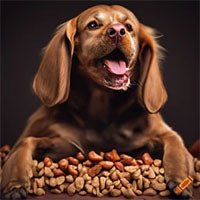
Grains or Grain-Free: Choosing the Right Dog Food for Your Furry Friend
Emma Davis Tags:Are you contemplating whether to feed your beloved canine companion grains or grain-free dog food? As a pet parent, one of the most important decisions you need to make is about your dog's diet. An increasing number of women aged 25 to 60 are questioning the ideal diet for their dogs, and this article aims to shed light on that dilemma.
Research shows that a dog's diet plays a significant role in their overall health and longevity. However, the discussion of whether to feed dogs grains or choose grain-free food options can be confusing. Today, let's unravel the mystery and help you make an informed choice.
Grains: Pros and Cons
Grains like rice, oats, and barley are commonly found in many dog foods. They provide essential nutrients such as carbohydrates for energy, fiber for digestive health, and certain vitamins and minerals. Dogs, unlike wolves, their ancestral relatives, have evolved to digest grains effectively over thousands of years of domestication.
However, not all grains are created equal. Some dogs may develop allergies or intolerance to specific grains like wheat or corn, causing digestive issues, skin irritations, or other health problems. If your dog exhibits any of these symptoms, it might be worth consulting your vet about a possible grain intolerance.
Grain-Free: Pros and Cons
Grain-free dog food has surged in popularity, especially amongst affluent pet owners who equate it to a more 'natural' or 'premium' diet. These diets typically replace grains with alternative carbohydrate sources like potatoes or peas.
The advantage of grain-free food is that it can be beneficial for dogs with specific grain allergies or intolerance. However, it's important to note that grain allergies are not as common as some may think - they only affect a small percentage of dogs.
A potential downside of grain-free diets came to light when the Food and Drug Administration (FDA) released a report linking them to a condition called dilated cardiomyopathy (DCM) in dogs. While the cause is still under investigation, it has led many pet owners and vets to question the safety of grain-free diets.
Making the Right Choice
As a pet parent, your goal is to provide the best care for your furry friend. That includes making an informed choice about their diet based on their individual health needs and not just marketing trends.
First, observe your dog. If they're energetic, have a shiny coat, and good stool consistency while eating a diet containing grains, there might be no need to switch to grain-free. If they have recurring health issues like digestive problems, skin conditions, or weight issues, consult with your vet to see if a diet change might help.
Second, remember that dogs are omnivores, and balance is key. Whether you opt for grains or grain-free, your dog’s food should have a balanced mix of proteins, carbohydrates, and fats.
In conclusion, the grains vs. grain-free decision should be made in consultation with your vet, taking your dog's health, lifestyle, and preferences into account. The perfect diet for your dog is one that keeps them healthy and happy. Remember, what's right for one dog might not be right for another. Above all, our dogs rely on us to make the best decisions for them, and armed with knowledge and veterinary advice, we can do just that.
